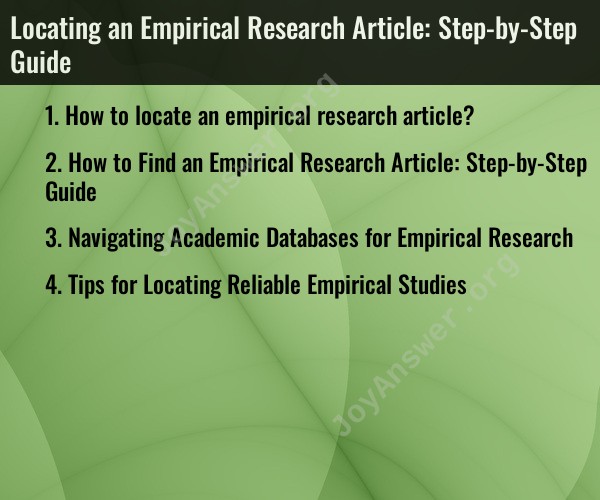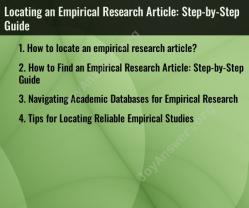How to locate an empirical research article?
Locating an empirical research article can be a straightforward process if you follow these step-by-step guidelines:
Define Your Research Topic:
- Clearly define your research topic or question. Know what specific subject or area you are interested in.
Choose a Database:
- Select an appropriate academic database. Some popular ones include PubMed (for medical and life sciences), JSTOR, PsycINFO (for psychology), IEEE Xplore (for engineering), and Google Scholar.
Use Keywords and Phrases:
- Develop a list of keywords and phrases related to your research topic. Be as specific as possible.
Conduct a Search:
- Use the selected database's search function to enter your keywords and phrases. You may also use Boolean operators (AND, OR, NOT) to refine your search.
Refine Your Search:
- Depending on the number of results, you may need to refine your search. You can use filters like publication date, document type (empirical research), and subject area.
Review Search Results:
- Examine the search results to identify empirical research articles. Look for articles that are published in peer-reviewed journals.
Access the Full Text:
- Click on the article title or link to access the full text. Some articles may be available for free, while others may require access through a university or library subscription. You can also use interlibrary loan services to access articles not available at your institution.
Read and Evaluate the Article:
- Carefully read the selected article to determine if it is indeed an empirical research article. Look for research methods, data, results, and conclusions. Pay attention to the abstract, introduction, methods, results, and discussion sections.
Cite the Article:
- If the article is relevant to your research, make sure to cite it correctly in your own work.
Keep Track of Sources:
- Organize and save your sources in a bibliography management tool, such as Zotero or EndNote, to facilitate citation management.
Remember that locating an empirical research article may take some time, especially if your research topic is specific. It's essential to be patient and persistent during the process. Additionally, university or institutional libraries often provide access to a wide range of academic databases, making it easier to find the research articles you need.
How to Find an Empirical Research Article: Step-by-Step Guide
Step 1: Identify your topic. What do you want to learn about? What questions do you have? Once you have a good understanding of your topic, you can start to narrow down your search.
Step 2: Choose the right database. There are many different academic databases available, each with its own strengths and weaknesses. Some databases are more general, while others are more specialized. When choosing a database, consider the following factors:
- The scope of your topic
- The level of your research
- The resources available to you
Step 3: Develop a search strategy. Once you have chosen a database, you need to develop a search strategy. This will help you to find the most relevant articles for your topic. Your search strategy should include the following elements:
- Keywords: Brainstorm a list of keywords related to your topic.
- Boolean operators: Boolean operators (AND, OR, NOT) can be used to combine keywords and refine your search.
- Limiters: Limiters can be used to narrow down your search results by publication date, language, and other criteria.
Step 4: Evaluate your results. Once you have conducted your search, you need to evaluate your results. Take some time to read the abstracts of the articles you found. Identify the articles that are most relevant to your topic and read them in full.
Navigating Academic Databases for Empirical Research
Academic databases can be overwhelming, but they are essential for finding empirical research articles. Here are a few tips for navigating academic databases:
- Use the advanced search features. Most academic databases have advanced search features that allow you to refine your search results. These features can be very helpful for finding empirical research articles.
- Use limiters. Limiters can be used to narrow down your search results by publication date, language, and other criteria. This can be especially helpful if you are looking for recent or peer-reviewed articles.
- Look for the abstract. The abstract is a brief summary of the article. It is a good way to quickly determine if an article is relevant to your topic.
- Look for the methodology section. The methodology section will tell you how the study was conducted. This is important information to evaluate the reliability of the study.
Tips for Locating Reliable Empirical Studies
When locating reliable empirical studies, it is important to consider the following factors:
- The source of the article. The article should be published in a reputable academic journal.
- The author's credentials. The author should be a qualified researcher with expertise in the topic.
- The methodology. The study should be conducted using rigorous methods.
- The findings. The findings of the study should be presented in a clear and concise manner.
You can also use the following resources to help you locate reliable empirical studies:
- Scholarly search engines: Scholarly search engines such as Google Scholar can help you find empirical research articles published in academic journals.
- Library databases: Library databases such as PsycINFO and ERIC provide access to empirical studies on a wide range of topics.
- Librarians: Librarians can help you find and evaluate empirical research articles.


